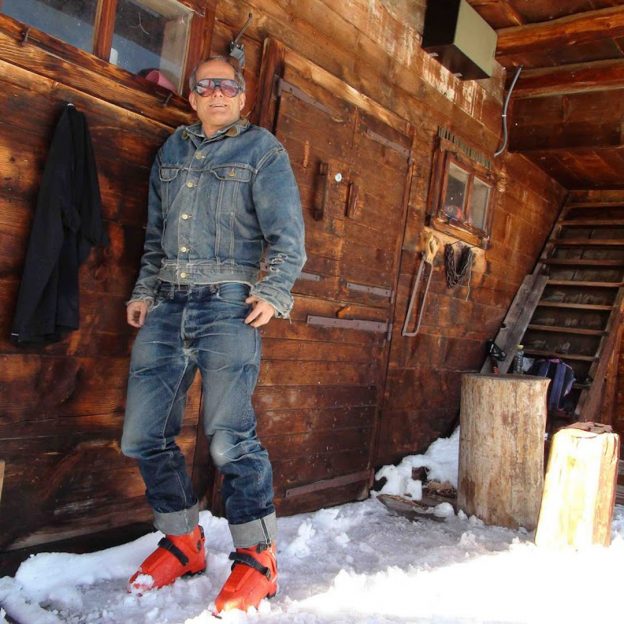We at Denimio strive to offer the widest selection of Japanese denim to people all over the world. You might buy Japanese denim for its quality, construction, fabric, craftsmanship, fit, and various other reasons. Knowing what you buy is essential when starting off in the world of Raw Denim.
Many customers often ask us, what’s the difference between “non-wash” and “one-wash” denim? The answer, while very simple, can heavily influence your decision when buying the perfect pair of Japanese denim slacks.
Technically, “one-wash” jeans have been washed once by an industrial washing machine to eliminate most of the shrinkage within the fabric. Both treatment options (OW vs NW) are widely available in the Japanese denim scene. As Japanese manufacturers strive to have customers easily find their correct size, most denim from Japanese retailers is “one-wash”. Unless stated, “non-wash” options are also available for most brands that focus on vintage fabrics or have roots in vintage reproduction.
So… how are they different and what difference does it make to you? You might need to understand the nature of certain denim fabrics first.
Sanforized Denim
For sanforized denim, it doesn’t make a difference whether it is “one-wash” or “non-wash” as sanforized denim has been through a process called sanforization. In other words, the fabric has been treated to minimize shrinkage when washed. This reduces the shrinkage potential from 5-10% to only 1-2% max.
„If you like your sanforized denim jeans to be crispier and a little bit darker, the “non-wash” option is best.“

The reason why it doesn’t really matter when it comes to sanforized denim is that the shrinkage is minimal regardless of which treatment is used. If you happen to come across a size chart of “one-wash” and “non-wash” sanforized denim, you will see that the difference is only around 0.5” in most cases. This difference is quite minimal as, once you wear the jeans, they will stretch out. Japanese makers like Japan Blue and Momotaro often use a “one-wash” treatment for most of their items.

If you like your sanforized denim jeans to be crispier and a little bit darker, the “non-wash” option is best. If you want something a little bit easier to wear, the “one-wash” option should be able to help you break in your jeans with much more comfort.
Unsanforized Denim
This is where the washing treatment matters. As you might know, unsanforized denim is not treated during the weaving process to eliminate shrinkage. Therefore, you can expect lots of shrinkage to your jeans in your first soak if you buy them Non-Washed. The shrinkage can vary from 5% to 10%.
One-Wash
We at Denimio almost always recommend new customers, who have never tried unsanforized denim, to opt for the “one-wash” denim. This is because it is much easier to size. Buying unsanforized jeans in their raw “non-wash” state requires a lot of research before committing to buying a pair. Some jeans shrink a lot, requiring most people to size up to accommodate the shrinkage. Some jeans require 3-4 hot soaks to get all the shrinkage out of the jeans. Other unsanforized jeans might not shrink much, if at all. The “one-wash” option allows you to exchange the jeans if they size them incorrectly from the get go. Most places (including Denimio) will not accept returns or exchanges if the jeans have been washed or soaked.

Pros of choosing “one-wash” unsanforized denim:
– Easier to size
– Easier to exchange
– Does not require extra steps before starting the fading process
– Prevents unwanted shrinkage after fading has already been achieved
„When it comes to unsanforized raw denim, the “one-wash” treatment will make your life easier.“
In contrast, it is often hard to gauge how much unsanforized “non-wash” jeans will shrink. The jeans might fail to fit the same way you expected they would after the initial hot soak, or look different from when you first tried them on.
When it comes to unsanforized raw denim, the “one-wash” treatment will make your life easier. Once you get them, you don’t have to worry about anything and you can just rock those jeans. No need to soak them before wearing. No need to account for extra inseam during shrinkage. More importantly, you can buy jeans online according to the size chart provided.
Non-Wash
For most denim purists, buying loomstate denim in their true raw form is the only way to go. Of course buying “non-wash” unsanforized denim has its benefits too. For example:
– Experience the “Shrink-to-Fit” effect
– Have initial soaking rituals like in the old times
– Live the raw life like no one other than @swissjeansfreak

„As they are not treated, the jeans will be much crispier due to the starch in the denim fabric from the weaving process.“
Buying “non-wash” unsanforized denim can also be quite an adventure. In olden times, before the days of sanforization, people would wear their jeans and sit in the tub for an hour to shrink them to fit their body. Buying loomstate denim allows people to experience the “Shrink-to-Fit” effect. As mentioned earlier, unsanforized denim will shrink up to 5-10%. This allows the jeans to shrink and be molded to the wearer perfectly. Certain areas such as the waist will stretch back with some wear. This also depends on the type of weave used such as the loose weave fabric and the tight weave fabric.
As they are not treated, the jeans will be much crispier due to the starch in the denim fabric from the weaving process. You might be able to make your jeans stand up too if they are stiff enough.

Some denim purists, like Ruedi from Jeans Museum, @swissjeansfreak, would encourage everyone to wear their jeans 100% raw. As you can see on his Instagram page, his fades are one of a kind. To achieve that is „easy“ – simply buy the jeans, wear them, and never allow them to touch water, ever! Are you up for that challenge?
Now that you know their differences, are you ready to checkout our Premium Japanese Denim Collection?

